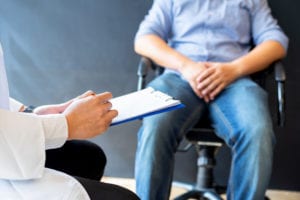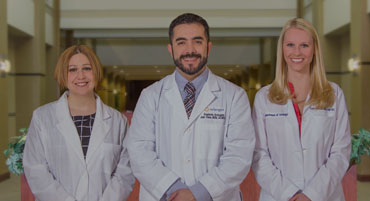Testicular Pain Treatment in Chattanooga & East Ridge, TN
Testicular Pain Treatment Through Medicine & Surgery
Experiencing testicular pain can be distressing, but with the right care, relief is within reach. At our state-of-the-art facility in Chattanooga, TN, Dr. Anand Shridharani, certified by the American Board of Urology, offers various treatments to address your discomfort and improve your quality of life.
You do not have to live with pain; a urology consultation can help you find a solution. Dr. Shridharani’s comprehensive services ensure you receive top-notch care that enhances your health and well-being.
Contact Us Today For A Consultation
Types of Testicular Pain
There are two types of testicular pain: acute and chronic. Acute testicular pain occurs immediately, and it is something you will definitely notice. All medical emergencies related to the testicles are considered acute.
Chronic testicular pain lasts over three months. It can be dull or sharp, come and go, and significantly impact one’s lifestyle.
Causes of Acute Testicular Pain

- Epididymis cysts that contain dead sperm cells (spermatocele). The epididymis is the tube that collects and transports sperm.
- Inflammation of the epididymis, which is usually due to an infection or inflammation.
- A hydrocele, a fluid-filled sac in the scrotum.
- Inflammation of the testicles, often due to mumps or infections from bacteria, viruses, and certain STDs.
- An inguinal hernia or kidney stone.
- Testicular cancer.
- Direct trauma to the testicles.
Causes of Chronic Testicular Pain
Chronic testicular pain can be due to:
- A varicocele (varicose veins of the scrotum)
- Inflammation of the epididymis, usually due to an infection
- Orchitis (testicular inflammation)
- Prostatitis (prostate inflammation)
- Back/spinal nerve injury
- Inguinal hernia repair with mesh, which can cause nerve entrapment and lead to chronic pain
- Hydrocele (clear fluid in the sac surrounding the testicle)
Signs You Should Call a Doctor
Consult a doctor about testicular pain if:
- You have sudden, severe testicular pain
- You have had an injury or trauma to the scrotum and still have pain one hour later
- Your pain is accompanied by nausea or vomiting
- You feel a lump in your scrotum
- You have a fever with testicular pain
- Your scrotum is warm, tender, swollen, or red
- You have been in contact with someone who has the mumps
- You have chronic testicular pain that affects your daily activities or lifestyle
How is Testicular Pain Diagnosed?
Your doctor will examine your groin, testicles, and abdomen. You will be asked questions about:
- The circumstances surrounding your pain
- Whether you have suffered an injury
- How long you have had this pain
- How it started
- Where the pain is located
- How severe and constant the pain is
- Whether your pain goes into your abdomen or back
- Any other symptoms
Blood tests, urinalysis, urine culture, and imaging studies, such as ultrasound, can diagnose the cause of your pain.
Testicular pain should not be ignored. It may be directly related to your testicles or may lead to the discovery of another health condition.
Testicular Pain Treatments
Chronic testicular pain can be extremely difficult to manage by healthcare providers and individuals. Luckily, advances in our understanding of testicular anatomy have improved our ability to treat testicular pain.
Dr. Shridharani is one of the few microsurgeons in the U.S. offering microsurgical spermatic cord denervation. Through 2 cm groin incisions, the tissue through which inflamed nerves travel can be cut, preventing pain signals from traveling from the testis.
This procedure is minimally invasive, does not compromise blood flow to the testicles, and does not impair fertility or erections. Initially, numbing medication is given in the urology clinic to determine whether the procedure will be successful. If the patient responds well to the numbing medication, the procedure has an 80% chance of permanently relieving pain.
If you suffer from chronic testicular pain, seeking specialist help is the first step in improving the quality of your life. Dr. Shridharani has taken a keen interest in managing urologic conditions that affect the quality of men’s lives. He has excellent outcomes treating testicular pain and works within a network of medical specialists and physical therapists to get you pain-free as soon as possible.
What is Spermatic Cord Denervation?
Spermatic cord denervation, also known as cord stripping, is a minimally invasive surgical procedure. It resolves or reduces chronic testicular pain in men who have not responded to conservative treatment approaches. These surgeries aim to remove the small nerves in the spermatic cord, eliminating or reducing the nerves causing the chronic pain messages.
How is Spermatic Cord Denervation Performed?
Watch the video below to learn more about the microsurgical spermatic cord denervation procedure and how it is performed by Dr. Shridharani.
Dr. Shridharani performs these microsurgeries as outpatient procedures. They take approximately 45 minutes.
Dr. Shridharani starts by making a small two-inch incision in the groin to access the spermatic cord. Working through an operating microscope, he separates all the structures in the spermatic cord, including the veins, nerves, and vas deferens. The arteries to the testicle and the lymph glands are left untouched. He then removes the small nerves in the spermatic cord, removing the source of the pain signals. Finally, he closes the incision and completes the procedure.
How Does Spermatic Cord Denervation Help With Chronic Testicular Pain?
These surgeries remove the small nerves in the spermatic cord. Doing so eliminates the source of the patient’s chronic pain.
How Successful is Spermatic Cord Denervation?
Studies on these surgeries have shown a high success rate without any impact on the physiological function of the testes. Approximately 75 percent of patients receive complete pain relief, and another 9 percent receive partial pain relief. The results are immediate.
For men suffering from chronic testicular pain that has not responded to conservative treatments, these new surgeries with Dr. Shridharani can be life-changing.
Does Spermatic Cord Denervation Surgery Impact Fertility and Other Functions?
No, these are minimally invasive surgeries. They do not compromise blood flow to the testicles, so neither fertility nor erections are impaired.
What is Recovery Like After These Surgeries?
Recovery is straightforward. Patients should rest at home for 2 to 5 days and avoid strenuous activities. Then, they can decide when to return to work and other normal activities.
What People Say About Us!
Extremely pleasant experience overall. The staff and nurses were very professional but also friendly. Dr. Shridharani was very professional, knowledgeable and also friendly. He talks in terms that the average person understands. Even tho I did not qualify for the procedure I came to see him about, he took lots of time to explain my options. I would highly recommend him and his staff.
– Joseph S
Click here to read more reviews.
What Lifestyle Changes Can Help Manage Chronic Testicular Pain Before Considering Surgery?
You can use several strategies to manage chronic testicular pain before considering surgery. Here are some practices to try:
- Wear Supportive Underwear: Snug underwear can reduce testicle strain and discomfort.
- Avoid Prolonged Sitting: Long periods of sitting can exacerbate pain. Use a cushion or stand periodically.
- Reduce High-Impact Activities: Activities like running or heavy lifting may worsen pain. Low-impact exercises (swimming, walking, etc.) can be better alternatives.
- Maintain Proper Posture: Slouching can contribute to pelvic and testicular discomfort. Sit upright with good lumbar support.
- Apply Cold Packs: Applying an ice pack for 10-15 minutes can help reduce inflammation.
- Try Pelvic Floor Therapy: Pelvic muscle tension can cause chronic testicular pain. A physical therapist specializing in pelvic pain may be helpful.
- Consider Nerve Blocks: In some cases, nerve blocks may temporarily reduce pain signals.
- Stay Hydrated: Drinking water helps prevent urinary tract infections (UTIs) and kidney stones. These conditions can contribute to testicular pain.
- Reduce Inflammatory Foods: Processed foods, excessive sugar, and alcohol can worsen inflammation and pain.
What Role Does Stress or Anxiety Play in Worsening Testicular Pain?

Increased Muscle Tension
Stress and anxiety often cause involuntary tightening of the pelvic floor muscles. This may cause chronic pelvic pain syndrome (CPPS), a condition that can contribute to testicular discomfort.
Tightened muscles in the lower abdomen, groin, and pelvic area also may restrict blood flow. This can aggravate nerve irritation in the scrotum.
Impact on Nerve Function
Chronic stress can dysregulate the autonomic nervous system (ANS), which is involved in pain processing. Sympathetic nervous system overactivity may lead to hypersensitivity of the nerves that supply the scrotum, resulting in persistent pain.
Disrupting Sleep and Recovery
Sleep is essential for pain recovery and inflammation control. Chronic stress and anxiety can both disrupt sleep. Poor sleep quality lowers the pain threshold and can create a frustrating cycle of increased pain and emotional distress.
What Are the Risks of Leaving Chronic Testicular Pain Untreated?
Leaving chronic testicular pain untreated can lead to several complications, including:
- Worsening Pain and Discomfort: Untreated chronic testicular pain may intensify over time and become debilitating.
- Underlying Medical Condition Progression: Delayed treatment can allow existing conditions to worsen. This can cause infections or organ damage.
- Sexual Dysfunction: Prolonged pain can interfere with sexual activity. This can lead to issues like erectile dysfunction, decreased libido, and difficulty maintaining intimacy in relationships.
- Reduced Fertility: Untreated conditions like varicocele, infection, or testicular trauma may result in lower sperm count, poor sperm motility, or even permanent damage to reproductive function.
- Nerve Damage (Neuropathy): Chronic pain can sometimes lead to peripheral nerve damage. This makes the condition harder to treat in the future and could result in permanent hypersensitivity or numbness.
Why Choose Dr. Anand Shridharani?
Dr. Anand Shridharani is a board-certified, fellowship-trained urologist specializing in male reproductive and prosthetic urology. He provides expert treatment for testicular pain to patients in Chattanooga, TN.
A recognized leader in the field, he is an active member of top organizations, including the American Urological Association and the Sexual Medicine Society of North America. He is also a Men’s Health Committee member and has co-authored international practice guidelines for the American Society of Reproductive Medicine.
Schedule a Consultation Today!
Dr. Shridharani proudly offers advanced treatments for testicular pain in Chattanooga and Knoxville, Tennessee, Northern Georgia, Huntsville, Alabama, and the surrounding areas. Call (423) 778-4MEN (4636) to schedule an appointment today!





